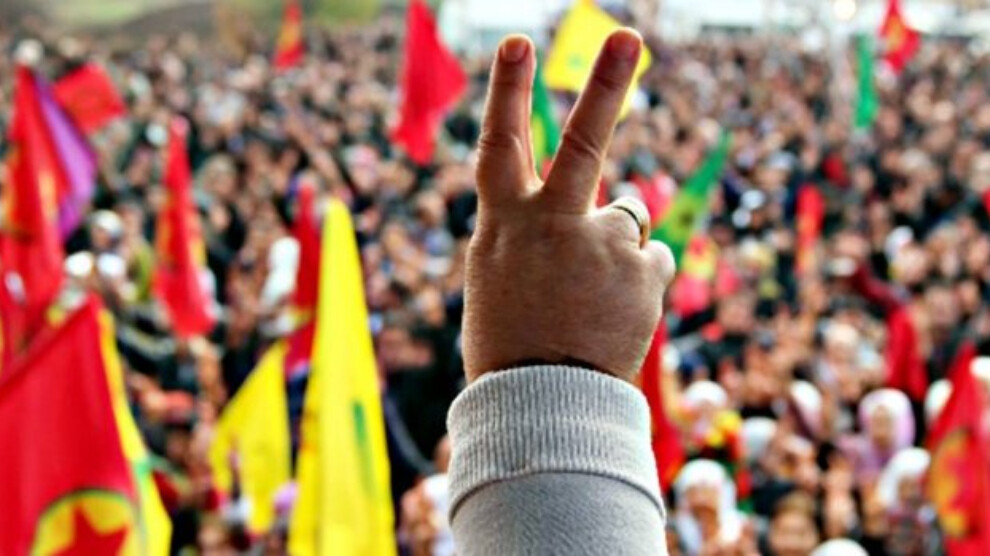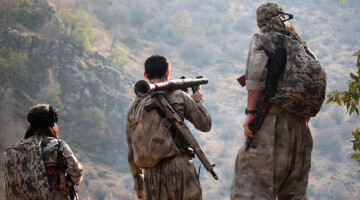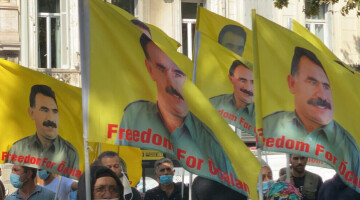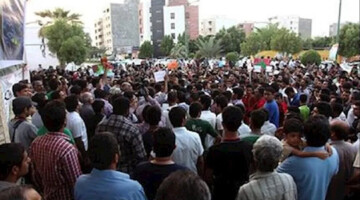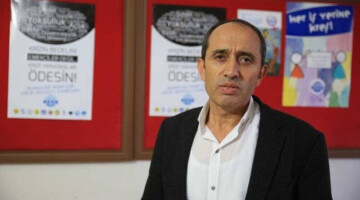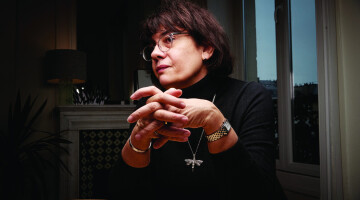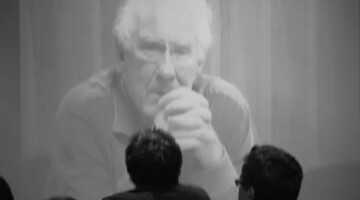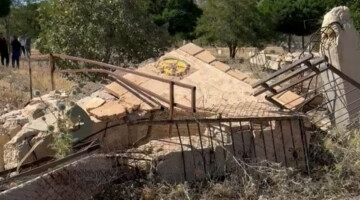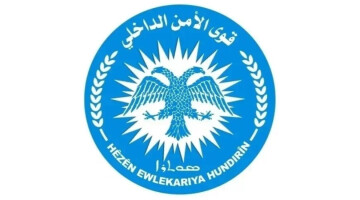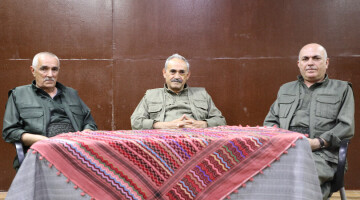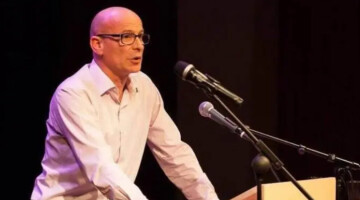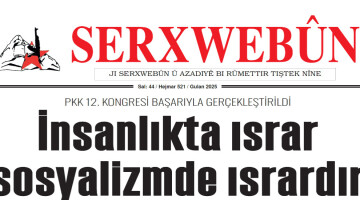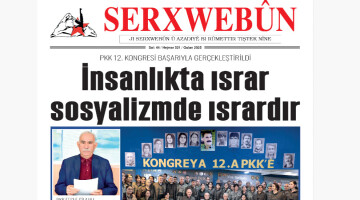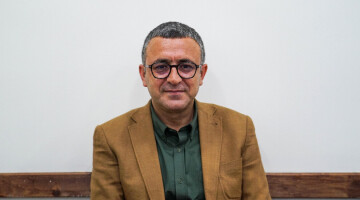One hundred years ago, the Treaty of Lausanne divided Kurdistan among the states of Turkey, Iraq, Iran, and Syria. Since the creation of the Turkish Republic in 1923, Turkey has pursued a broad and strategic policy of denial and annihilation of the Kurdish people within its borders. It has implemented this policy using all means and with the help of all military, educational, judicial, economic, and cultural institutions. Its aim has always been to annihilate the existence of Kurds, to destroy any resistance to this policy, and—if not successful—to assimilate the Kurds under the slogan “One flag, one nation, one language, one state” and the motto “Be proud to be a Turk.” Turkey does not permit the existence of any ethnicity or nationality other than Turkish, and the Turkish constitution allows only Turkish to be taught in schools. Hence, even the Kurdish language is taboo.
But also, since the foundation of the Turkish Republic, Kurds have resisted the policy of annihilation: in Kocgiri (1925), Dersim (1937–38), Botan, Agiri, Diyarbakir, and many more Kurdish regions. Unfortunately, the Turkish military crushed all of these revolts.
In the 1970s, when the Turkish annihilation policy became even stricter, the PKK was created under the leadership of Abdullah Öcalan. The founding of the PKK was a response to the nationalist, fascist, and genocidal policy of the Turkish state. No matter which government took power in Turkey, the policy toward the Kurds has never changed. The PKK represented a continuation of the many previous Kurdish uprisings and appealed for recognition of the fundamental democratic and national rights of the Kurdish population. In this way, the PKK insurgency, ongoing for almost 40 years now, has gained the support of nearly 80% of the Kurdish population.
Kurdish people have faced, and continue to face, unparalleled and unprovoked pressure for exposing the Kurdish question as a tragic product of European colonialism of generations past. Today, as the anniversary of the Lausanne treaty approaches, Europe continues to be a partner in an ongoing effort to stamp out the existence of one of the ancient peoples of the Middle East, a group who ask only to live freely and with dignity in their indigenous homeland.
Turkey forces the Kurdish people to live from crisis to crisis. Never since the brutal division of Kurdistan in 1923 have our people known a normal life. Never have we experienced stability or security. War, expulsion, assimilation, genocide, ecocide, and feminicides have all been consistent features of life throughout all four parts of occupied Kurdistan, with little respite. Meanwhile, EU member states have, for the most part, stood by their partners, the colonial states occupying Kurdistan, of which the first and foremost is Turkey.
The entrenched rulers in the region have long maintained their grip on power from generation to generation by subjugating the masses and pitting ethnic and religious groups against one another. But the strength of Kurdish grassroots democracy alarmed them, prompting various states to cooperate to illegally abduct the PKK’s founder and leader, Abdullah Öcalan, on February 15, 1999.
Still, not even this international conspiracy could defeat the resistance of the Kurdish people. Millions of Kurds accept Öcalan as their legitimate representative and as the leader of their resistance to Turkish state oppression. From 2013 to 2015, despite imprisonment and isolation, he played a central role in discussions of a peaceful solution. During those years, Turkey recognized that Öcalan was the only interlocutor who could establish an honorable and effective peace. Now they deny this reality.
Human Rights Violations
Turkey is conducting a systematic assault on the Kurdish people within its borders. It sets fires to forests, assassinates Kurdish politicians with armed drones, and jails thousands of Kurds who demand their inalienable human rights.
Amnesty International’s 2022 Turkey report shows that the Erdoğan regime has little regard for human rights. And on March 20, the US Department of State (DOS) released its annual 2022 Country Report on Human Rights Practices, detailing human rights violations committed by the AKP-MHP government.
The report highlights the government’s actions against the pro-Kurdish HDP, the progressive Peoples’ Democratic Party. The HDP calls for respecting the rights of all citizens of the country and an end to policies of military aggression and the stifling of freedom of expression. But the Erdoğan regime, as the report shows, has arrested and detained some 5,000 HDP leaders, lawmakers, and members.
In 2022 alone, the report states, seven former HDP lawmakers and six elected mayors in the Kurdish region were jailed on various charges. “Since 2019, the Ministry of Interior suspended 48 of 65 elected HDP mayors in the southeast based on allegations of support for terrorism related to the PKK; six additional HDP mayors were not permitted to assume office following the 2019 elections on the grounds that they had been dismissed from their public jobs by governmental decrees, despite being cleared for candidacy in elections.”
These detentions, the report continues, are unjustified. “Human rights groups alleged many detainees had no substantial link to terrorism and were detained to silence critical voices or weaken political opposition to the ruling Justice and Development Party (AKP), particularly the HDP or its partner party, the Democratic Regions Party.”
While in Turkish state custody, inmates die due to the actions of prison staff and the appalling physical conditions. These records are hidden from the public, but according to the Human Rights Association of Turkey, “as of December, between 61 and 73 prisoners died in prisons since December 2021. The HDP report found 39 dead due to illness and 34 due to suicide. HRA noted various causes including sickness, suicide, violence, and negligence.” And, “According to data from the Civil Society in the Penal System, from January to August there were 42 suspicious deaths.”
Today, the Erdoğan regime is trying to shut down the HDP altogether. It has initiated a closure case against the party that would ban 108 senior Kurdish politicians from electoral activities and from holding office. The case remains active in the constitutional court. Turkey will hold its next general elections on May 14. On April 11 the lists of candidates will be finalized: that is the day a decision will be made as to whether the HDP will be dissolved or not.
The Kurdish Alternative
But resistance to Turkish oppression and exploitation is on the rise. The Kurdish people have responded to stale and violent paradigms of nationalism with a new alternative, already being practiced in parts of Kurdistan, that allows for the peaceful co-existence of peoples regardless of ethnicity or religion and promotes the full and free participation of women in all spheres of life. Since his abduction, Mr. Öcalan’s philosophy has only grown in prominence and provided the framework for the heroic resistance of the Kurdish people.
The Autonomous Administration of North and East Syria (AANES) was established in 2012 as a beacon of democratic hope for all ethnic and religious societies in Syria. It is a democratic alternative to dictatorship and violent nationalism. It governs itself through democratic, decentralized structures, supports grassroots-based, pro-ecological sustainability, and is truly inclusive of all ethnicities. It puts women’s rights at the top of its agenda.
But from the outset, the Erdoğan regime attacked it militarily, and it continues to do so. It has used the full might of the Turkish military to invade and effectively annex parts of Iraq and Syria, attempting to justify this resurgent irredentism by citing Turkish national security interests or sensitivities, stoking the flames of war, and killing and displacing civilians already struggling to survive. Every day, the Turkish state commits war crimes and crimes against humanity in Turkish-occupied Afrin, Sere Kani and Gire Sipi.
The Erdoğan regime also promotes and supports numerous IS-like jihadist organizations. These terrorist groups have tried again and again to crush the autonomous administration but without success. Most famously, the Kurdish YPJ women have fought the death cult of ISIS and in victory, they have allowed the AANES to continue to be a regional and global alternative.
In the Kurdistan Region of Iraq (South Kurdistan), Erdoğan continues his war against Kurds by other means. Here too, as in the AANES, he uses armed drones and teams of assassins to hunt down his opponents, killing them in the streets and the countryside, in front of crowds and in their homes. Here Turkey has used chemical weapons and has built more than 100 military bases in South Kurdistan for NATO’s second largest army.
Another Erdoğan strategy in South Kurdistan has been to stir up conflicts between Kurdish parties. Although the Erdogan regime has won the KDP (Kurdistan Democratic Party) as a supporter in order to defeat the PKK, this has not been done. On the contrary, the KDP has lost sympathy within the Kurdish population and is increasingly disliked. Only the responsible behavior of the PKK has prevented an intra-Kurdish military conflict. Not even high-tech warfare can deter PKK fighters from protecting South Kurdistan against Turkish occupation.
In Iran, a theocratic chauvinistic dictatorship has misruled the country and persecuted its peoples since 1979. In East Kurdistan and beyond, the Kurdish movement’s slogan Jin, Jiyan, Azadî—“Woman, Life, Freedom”—has become a rallying cry for protesters.
Erdoğan’s “Turkey First” Strategy
For centuries, Turkey’s location, by bridging the Orient and the Occident, has allowed it to play a major geopolitical role. During the Cold War, Turkey assumed a role of strategic importance within NATO. Today, Erdoğan’s strategy of putting Turkish interests first leads him to disregard the rules to which members of international organizations must adhere.
When it comes to political, cultural, and military interventions in neighboring countries, Turkish foreign policy knows no limits. It has provoked Azerbaijan against Armenia. It threatens EU member states Greece and Cyprus.
Erdoğan has instrumentalized Islam to promote violent jihadism in the Middle East.
Simultaneously, he uses it to foster religious intolerance in Europe and beyond. For years, Erdoğan has openly weaponized Middle Eastern refugees in order to pressure (or many would say blackmail) the EU and international organizations.
During the war in Ukraine, Turkey has consistently chosen policies that oppose NATO’s approach to the conflict and has concurrently made great efforts to block the NATO membership bids of EU member states Sweden and Finland. While Erdoğan has portrayed himself as a mediator between Russia and Ukraine, he has actually empowered Putin, perhaps the EU’s chief adversary today. He does so to protect his interests in Syria, where the Turkish military and various jihadist proxy forces have taken control of several regions, including the Kurdish city of Afrin, which they have terrorized now for five years.
In Europe, Erdoğan’s violent campaigns against dissent respect no national borders, and they severely undermine the sovereignty of other countries, some of whom still turn a blind eye and inexplicably make efforts to maintain a partnership with the Turkish state. Yet the activities of Turkish Intelligence (MIT) in Europe directly destabilize countries. MIT monitors, intimidates, and abducts dissidents. Moreover, as seen most recently on December 23 in Paris, Kurds are even assassinated in European capitals!
Economic Collapse and Military Spending
Over the last half century, with strong support from the West, Turkey has become one of the world’s largest economies, with a Gross Domestic Product nearing one trillion dollars by 2013. But under Erdoğan’s unchecked authority, rampant corruption has been institutionalized. Turkey’s economic crises are unending, even as its various campaigns of military aggression seek to soak up domestic discontent with hyper nationalism.
In the 2003 budget brought to the parliament after the AKP first came to power, the Ministry of National Defense (MSB) was allocated a mere 10.2 billion TL Afterward its budget increased significantly every year: to 10.9 billion (2004), 13.3 billion (2008), 15.3 billion (2009), 15.9 billion (2010), 16.9 billion (2011), 18.2 billion (2012), 20.4 billion (2013), 21.8 billion (2014), 22.7 billion (2015), 27.8 billion (2016), and 28.7 billion (2017).
Now, with nothing to offer the Turkish people but war and militarism amid a failing economy, Turkey’s military expenditures have ballooned. In 2018, the defense budget soared to 40.4 billion TL. Dramatic increases continued at the same rate in the following years. The MSB budget was announced as 46.4 billion in 2019, 53.8 billion in 2020, 61.4 billion in 2021, 79 billion in 2022, and finally 182.7 billion in 2023. If we add the General Directorate of Security, General Directorate of Gendarmerie, and Coast Guard as well, plus the secret appropriations to these figures, the numbers would be even larger. Erdoğan’s regime keeps pouring in money to pursue his neo-Ottoman expansionist dreams.
Erdoğan’s Disaster: The Earthquakes
The earthquakes of February 6 killed tens of thousands of people and left many more homeless. But the political and institutional failures of the AKP-MHP’s ruling system worsened the earthquakes’ consequences. In effect, the earthquakes ripped off Turkey’s institutional façade. Not until two days after the earthquake did the state show its presence; delayed relief assistance led to far more causalities. The state’s inability to provide urgently needed aid and its ineffective response to people’s crucial and immediate needs exposed the collapse of Turkey’s institutional structures.
Kurds, led by the HDP, realized that they could expect no help from Erdoğan’s regime. Kurdish organizations immediately formed aid commissions that actively provided help despite state obstacles. Not only did the AKP-MHP government remain inactive for two days, it tried to prevent the aid work organized by the HDP by declaring a state of emergency.
The KCK Declares a Military Halt
Precisely at this tragic time, on the third day of the earthquake, the Community of Kurdistan Societies (KCK) declared an immediate halt to military actions on the Turkish-Syrian border area: “Due to this disaster and suffering experienced by our people, we, the executive of the movement, wanted to evaluate the process and the latest developments and to achieve some results on this basis. Because we respect people and human life. That’s why we don’t want to inflict pain upon pain. We evaluated the situation humanely, conscientiously and morally. We call on all our forces engaged in military actions to stop military actions in Turkey, in metropolises and cities. Again, we decided not to take action unless the Turkish state comes against us and attacks us. Our decision will be valid until the pain of our people is relieved and their wounds are healed. Of course, the attitude of the Turkish state will also be decisive in our decision.”
Shortly after the KCK issued this call, the central headquarters of the People’s Defense Forces (HPG) declared their support for it, stating, “The guerrillas are ready to support the KCK in their efforts to stop the fighting and thus contribute to alleviating the suffering of the affected population.”
KCK Executive Council member Sabri Ok explained on March 30 that influential politicians, states, and international actors had sent messages and greetings to the KCK leadership and demanding the declaration, sometimes directly and openly, sometimes in different ways. They assured the KCK that they would play their part for a peaceful period.
Unfortunately, the Turkish government shows no signs of reacting positively to the KCK’s peace offer. The day after the earthquake, the Turkish army bombed areas in North and East Syria that had been badly affected. During the month of February, according to the HPG, Turkish fighter jets carried out at least 30 air strikes and helicopters carried out 18 attacks in the Medya Defense Zones. Reportedly, these bombings were primarily directed against guerrilla resistance positions. During the same period, shells from tanks, howitzers, and other heavy weapons were recorded 876 times. In addition, 142 impacts or uses of shells enriched with phosphorus, unconventional bombs, and other warfare agents were counted.
During the month of March, the Medya Defense Zones were bombed 72 times by warplanes and 1,357 times by combat helicopters, howitzers, mortars, tanks, and heavy weapons. Guerrilla resistance positions were bombed 53 times with cannons containing phosphorus, banned bombs, and chemical weapons.
Sabri Ok stated on March 30: “The forces demanding inaction and ceasefire have seen our decision, but the Turkish state does not recognize this decision. It wants to see this as a weakness in life and practice. It wants to use this as an opportunity. There are attacks on guerrillas every day as before, even more than before. It also uses illegal and immoral attacks such as tactical nuclear bombs and chemical weapons against the guerrillas. HPG made a statement about this. The KCK Co-Presidency also made a statement. So this situation cannot continue if the attacks continue. The main factor for our movement to take this decision is moral and humanitarian. The intention of our movement should not be misused.”
Still, on March 26, KCK co-chair Bese Hozat stated that the KCK had decided to continue its military halt until after the elections of May 14. “We will evaluate this decision after the elections,” she said, noting that they have historic importance for the “peoples of Turkey.”
The May 14 Elections
The upcoming Turkish general elections will take place as the peoples of the Kurdish regions of Turkey and Syria are still coping with the immense consequences of the massive earthquake. Still, as Kurds want to build a strong democracy in Turkey, the elections provide an opportunity for building democratic change and developing political solutions to the Kurdish question.
In this context, the KCK’s ceasefire declaration creates a historic opportunity for common sense and participatory democracy with a new understanding based on peace, dialogue, human dignity, equality, freedom, and justice.
At this critical juncture, with the Erdoğan regime showing vulnerability, it is of the utmost importance that the EU, US, UN, and Council of Europe (CoE) deliver a firm message that the election must be free and fair, and that they will not tolerate the intimidation of opposition politicians and voters. These international organizations should do everything within their power to observe and ensure fair elections in Turkey.
The international organizations should also pressure the Turkish government to accept the KCK’s peace initiative. By offering this initiative, the Kurdish freedom movement has once again credibly demonstrated that it is interested in finding a political solution to the thirty-nine-year war between the Turkish state and the PKK. If the AKP regime can be persuaded to accept the peace initiative, the catastrophe of the earthquake could become an opportunity for a lasting peace in the region.
Öcalan’s Freedom is Crucial for the future of the Kurds
For this, Turkey’s illegal regime in Imrali Prison Island must be ended immediately. Since 25 March 2021 there has been no contact with Mr Öcalan, and we have no indication of his condition. It is therefore urgent that an independent medical delegation, as well as his lawyers, be granted access to him. This can be achieved through international political pressure. The Council of Europe (CoE), with its Committee for the Prevention of Torture (CPT), and the UN Human Rights Commission are responsible for ensuring compliance with international law on the prison island of Imrali, as Turkey is a member of these bodies.
In the Turkish elections, then, the international community bears an enormous responsibility. It can play a constructive role for peace if it pressures Turkey to accept peace. Moreover, the EU, NATO, and the CoE need to decide if they want Erdoğan to remain at Turkey’s helm. Will these international organizations and Turkey’s partner states finally consider the proposals of opposition forces in the country, and above all, those of the HDP?
Based on historical precedent, we can unfortunately predict that in the absence of such international pressure and oversight, the suffering of the people of Turkey and Kurdistan will continue. The Kurdish side has always sought to address the Kurdish issue through peaceful dialogue. International support and efforts are needed to prevent further suffering, to comfort those who have experienced loss, to heal the wounds of those trying to rebuild their lives, and to create a peaceful environment.
The EU, US, OPCW, WHO, ICR and the UN cannot continue to avert their eyes from Turkey’s crimes because of its geopolitical value to the West. International laws are universal regardless of the perpetrator. The agonizing moans of the latest Kurdish victims as they convulse and take their last breaths are calling out to the entire world: Peace! Freedom! and fair elections!

